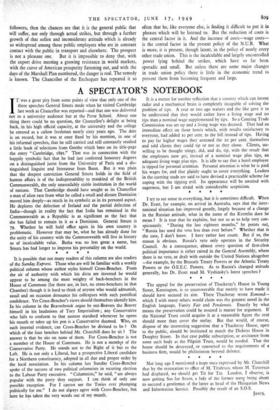I try to see sense in everything, but it is
sometimes difficult. When Dr. Evatt, for example, on arrival in Australia, says that the inter- national situation has improved greatly, largely because of a change in the Russian attitude, what in the name of the Kremlin does he mean ? It is true that he explains, but not so as to help very con- spicuously. " During the last eighteen months," he points out, " Russia has used the veto less than ever before." Whether that is the case, I don't know. I have rather lost count. But if so, the reason is obvious. Russia's veto only operates in the Security Council. As a consequence, almost every question of first-class political importance is either raised in the General Assembly, where there is no veto, or dealt with outside the United Nations altogether —for example, by the Brussels Treaty Powers or the Atlantic Treaty Powers or the O.E.E.C. Powers. As to Russia's changed attitude generally, has Dr. Evatt read M. Vyshinsky's latest speeches ?






































 Previous page
Previous page